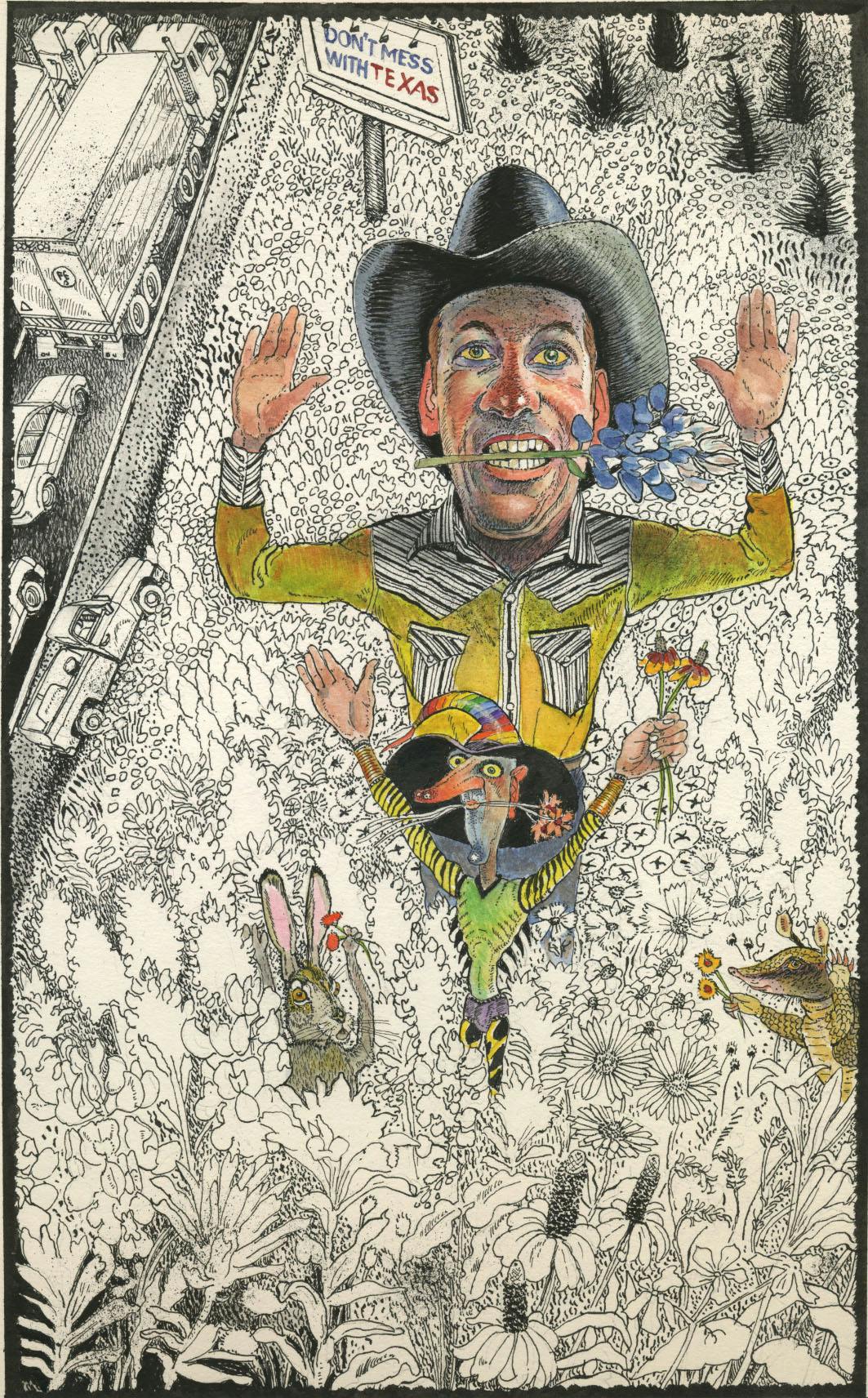
Q: I was wondering if you could explain proper bluebonnet protocol. I was always taught not to pick any bluebonnets, because they belonged to Texas. Is this true?
Lindsey Bacon Bertrand, College Station
A: Texas is crisscrossed by more miles of public roadways than any other state in the union, and from the time these scenic byways were first blazed through the wilderness, our ingenious forebears have been toiling, often in obscurity, to ensure that there would be a sufficient number of attractions along them. It is thanks to the efforts of these pioneers that we have so many spots at which to pull over and snap photos, worthy locales like the Cadillac Ranch, in Amarillo; the Beer Can House, in Houston; the Leaning Water Tower, of Groom; the former World’s Largest Pecan, in Seguin; and Pancho Villa’s mummified trigger finger, in El Paso, to name just a few. But the works of man, sublime though they may be, will always pale in comparison with the annual blossoming of bluebonnets. Lupinus texensis—as she is known to, well, nobody—is, along with four other lupines, the state flower, and as such she does belong to Texas, but only in the sense that enchiladas and the music of Bob Wills do. No statute on the books prevents you from plucking a bouquet from the public medians and shoulders alongside our highways (as for flowers growing on private property, the Texanist assumes you need not ask that question). Yet even though the uprooting of one of these blossoms will not result, as many children are taught, in the sudden arrival of an angry posse of Texas Rangers, come to drag you off by your ear and toss you in the hoosegow, you should nonetheless refrain. While not officially outlawed, the act of pulling up a bluebonnet remains a Texas taboo of the highest order, worse than even vegetarianism or rooting for the Redskins. Proper protocol is simple: Leave the flowers in the state in which they were found, which is to say, unpicked.
Q: I have found that many “kolache” bakeries don’t sell kolaches but klobasniki instead. One bakery I visited even had the audacity to have a “fruit kolache” section on its menu. I asked the lady working there why they were being redundant, and after blankly staring at me for a while, she explained that a “real” kolache is filled with meat but that they also made fruit kolaches. To no surprise, this lady was not Czech. I ordered some fruit kolaches to find a roll with cream cheese and pie filling on top, without popsika. What has happened to kolaches in this state?
Nathan Kyle, Austin
A: The last time he was asked to explain what happened to the kolaches, the Texanist was standing in close proximity to an empty platter. He feels more comfortable fielding this query, partly because you are absolutely right: A kolache (sometimes “kolachy”) traditionally has fruit, and a klobasnik (sometimes “klobasnek”) traditionally carries sausage. The semantic problems you observed arise when a traditional dish attains a high level of popularity with a nontraditional audience, as has happened with these Czechoslovakian treats here in Texas. Since fewer and fewer patrons of our “kolacherias” speak the pastry’s native tongue (or care, as you plainly do, about accurate pastry terminology), is it any wonder that the bakeries themselves begin to adjust to this uninformed yet hungry populace? The proof, anyway, is in the pudding, or in this case, the filling. The Texanist suggests that in the future you ignore all signage, simply point at the case and say, “I’ll have two of those, two of those, one of those, three of that, and a cup of coffee, please,” and let your taste buds determine the true state of our kolaches.
Q: I was fishing on Toledo Bend Reservoir with some friends recently and kind of inadvertently broke the law. I realized the night before our sunrise outing that my fishing license had expired, but I went out anyway. And the next morning too. I came up totally empty, but this has made me wonder, Do you need a license to fish or just to catch fish?
Name Withheld
A: The law on this is clear: Fishing state waters, like Toledo Bend Reservoir, requires a fishing license. Period. Unless it happens to be the first Saturday in June, in which case it’s Free Fishing Day. Period. Or unless you happen to be fishing from the bank of a state park or on waters completely enclosed by a state park. Period. Or unless you were born before September 1, 1930, or are under seventeen years of age. Comma. Or unless you qualify for a handful of other exemptions. Period. Assuming that none of these apply, you were breaking the law. Exclamation point. Well, that’s the letter of the law, at least, but in regard to your question, the Texanist has often wondered if the many exceptions listed above should not also include an immunity for the chronically unlucky. The Texanist is thinking of this friend of his who was born under a bad sign. Unluckiest fellow you’ve ever seen. You could sit him on the bank of the sweetest honey hole in Texas with a tackle box full of high-end jigging spoons and this dude would get nary a nibble. Can’t catch a cold. Once, he tried to return a carton of night crawlers, claiming they were defective (no luck there either). The Texanist shudders to think how much money this poor devil has laid out over the years on gear, bait, instructional videos, et cetera. None of it has helped. So here we have a man who is guaranteed to never catch a damn thing. Should his futile piscations, which do nothing to disturb the aquatic life of our rivers, lakes, and seashores, require a license? Well, yes, actually. It’s called fishing, not catching. And it requires a permit.
Q: I have received three speeding tickets in the past two years. My wife has been riding shotgun on all three occasions. On the last one she asked me, quite angrily, why I always say thank you to the officers. What exactly is the proper response in this sort of situation?
Name Withheld
A: Driving friendly is the Texas way, and the Texanist finds no fault in your kindly responses to the ticketing agents of the highway patrol. They are, after all, just doing their job. Your query, however, begs a few questions with regard to the behavior of your co-pilot, which may help to get at the root of the problem. Does she ever angrily ask why your knuckles aren’t white? Why the bugs are splatting on the windshield with so little velocity? Why you’re not yet at your destination? Or why you’re driving so damn slow? If so, it may be time to tighten the reins on your lead-footed lady and have her just enjoy the ride.








